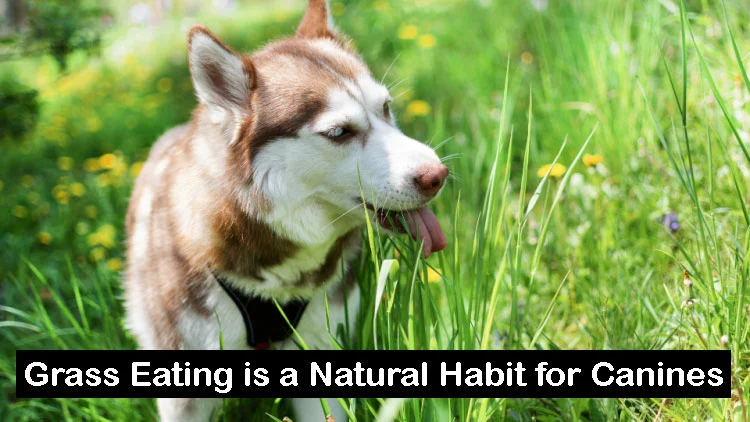Many dog owners have probably noticed their canine companions eating grass, but they may not know why their dogs do this. The concern of some pet owners is warranted because this behavior can range from a casual nibble to an all-out binge of large amounts of grass.
In this introductory section, we will discuss why some dogs eat grass and when this might be a cause for concern. Knowing the reasons why dogs eat grass can help pet owners decide if it’s a normal part of a dog’s behavior or if there’s a more serious health problem at play. This guide will help dog owners of all experience levels understand the phenomenon of their canine companions eating grass.

In this primer, we’ll explore the many hypotheses about canine grass-eating, including those pertaining to dietary preferences, intestinal health, and even pure instinct. We’ll also take a look at how various types of grass might affect canines. In addition, we’ll analyze the warning signs that indicate it’s time to take your dog to the vet if he or she has suddenly started eating grass.
1. Chlorophyll is Essential for Your Dog’s Health

Many plants, such as grasses and greens, contain the natural substance chlorophyll. It is necessary for photosynthesis, the process by which plants convert solar energy into chemical energy. Chlorophyll is an essential nutrient for plants, but it also has been shown to be beneficial for canine health. Chlorophyll is a powerful antioxidant that has been shown to aid in digestion, strengthen the immune system, decrease inflammation, and even freshen breath. Simply by including more chlorophyll-rich foods and supplements in your dog’s diet, you can support his or her health and well-being.
Here are some key points about the benefits of chlorophyll for dogs:
- Improves digestion: By encouraging the growth of good bacteria in the gut, chlorophyll can help to lessen digestive issues like gas, bloating, and constipation.
- Immune system booster: Chlorophyll has antimicrobial properties that may help to strengthen your dog’s defenses against disease.
- Chlorophyll has anti-inflammatory properties that make it useful in reducing inflammation in the body, which can help to alleviate a number of health issues.
- Freshens breath: If your dog has a propensity for having stinky breath, adding chlorophyll to their diet will help to naturally freshen their breath and help to eliminate unpleasant odors.
- Promotes overall health: Including chlorophyll in your dog’s diet can help to support overall health because it is a source of antioxidants, vitamins, and minerals that are crucial for good health.
2. Helping Your Furry Friend through Digestive Upset

For dogs, digestive upset can be a common and uncomfortable issue. It may result in symptoms like nausea, vomiting, appetite loss, and stomach pain. There are steps you can take at home to help your furry friend feel better, though veterinary care is always advised for severe digestive issues.
There are many options available to support your dog’s digestive health and relieve symptoms, from dietary changes to natural remedies. This article will examine these remedies and offer pointers and suggestions on how to assist your dog through digestive distress so you can keep your pet at ease and on the road to recovery.
Points:
- Probiotics
- Ginger
- Plain, boiled rice
- Chicken or beef broth
- Banana
Here is a table summarizing important information:
| Remedy | Benefits | How to Use |
|---|---|---|
| Probiotics | Restores the balance of good bacteria in the gut | Supplement with a high-quality product |
| Ginger | Natural anti-inflammatory | Add a small amount to your dog’s food |
| Plain, boiled rice | Binds stools and reduces diarrhea | Offer a small amount of cooked rice as a treat |
| Chicken or beef broth | Rehydrates and settles the stomach | Offer a small amount as a treat |
| Banana | Good source of fiber | Offer small pieces as a treat |
The Importance of Supporting Your Dog’s Digestive Health
Your dog’s digestive system is very important to his or her overall health. The ability to efficiently absorb nutrients, flush out waste and neutralize harmful bacteria and toxins all depend on a digestive system that is in good working order. However, many things, such as food choices, stress levels, and preexisting conditions, can cause tummy trouble. If you care about your dog’s digestive health, you should give it a healthy, well-balanced diet, minimize its stress, and treat any underlying medical conditions.
Having your pet examined by the vet on a regular basis can help catch any digestive issues early on and keep them from becoming life-threatening. You can do your best to ensure that your dog is always content, healthy, and pain-free by taking preventative measures to address any issues with his or her digestive system.
3. Grass Eating is a Natural Habit for Canines

Dogs’ odd habit of chowing down on the lawn often leaves their owners baffled. Grass eating may seem peculiar to humans, but it’s actually a canine instinct with multiple potential origins. This article will discuss why dogs eat grass, the advantages and disadvantages of this practice, and the steps that can be taken by dog owners to minimize the risk to their pet’s health.
- Grass eating is a natural instinct for dogs and is not always a sign of an underlying health issue.
- Dogs benefit from the fiber and improved digestion that comes from eating grass.
- Some canines resort to ingesting grass when they have an upset stomach or need to vomit.
- Ensure that the grass your dog is eating is free of pesticides or other harmful substances.
- Observe your dog’s overall health and behavior to determine if there is a need for veterinary intervention.
- Provide your dog with a balanced diet and plenty of exercises to reduce their need to eat grass.
Understanding Canine Grass Consumption: Is it a Concern?
Dogs eating grass may seem like a strange habit to their owners. It’s normal to worry that the strange behavior of our pets points to a health issue. The goal of this piece is to inform readers about feeding grass to dogs and provide useful advice for pet owners. Dog owners who take the time to educate themselves on the whys, whats, and wherefores of their canine companions’ penchant for munching on the lawn are better equipped to deal with this common occurrence. Whether you’re a new dog owner or a seasoned pro, this article will equip you with the knowledge you need to protect your dog’s health and happiness.
Wrapping Up:
The reason why dogs eat grass has long puzzled pet owners and scientists alike. While much remains to be discovered about this behavior, several hypotheses have been proposed, including self-medication, nutritional deficiencies, and exploratory motivations. It is generally accepted that a dog eating grass is safe and normal, but if you are concerned about your dog’s health, you should consult your veterinarian. Understanding the scientific rationale behind canine grass consumption will allow us to provide superior care for our four-legged friends and gain a deeper appreciation for their complex and fascinating world.
